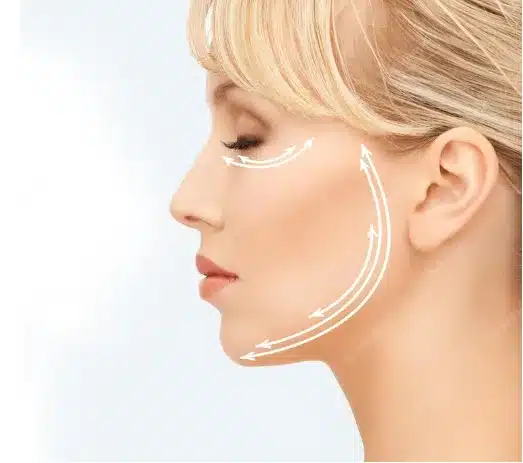Facial Prosthesis Surgery, a crucial component of maxillofacial reconstruction, offers transformative solutions for individuals with facial defects. Utilizing advanced techniques and customized prostheses, this specialized field aims to restore facial aesthetics and functionality, providing hope and rehabilitation to patients facing profound facial challenges. Through innovative approaches and tailored interventions, Facial Prosthesis Surgery plays a pivotal role in improving the quality of life for those affected by congenital anomalies, trauma, or post-cancer reconstruction needs.
Different Types of Facial Prosthesis Surgeries
Several types of facial prosthesis surgeries can address specific facial structures:
- Nasal Prosthesis: Nasal prostheses are designed to replace the nose, whether partially or entirely. These prostheses are custom-made to match the natural skin color, texture, and contours, providing a natural appearance.
- Auricular Prosthesis: Auricular prostheses reconstruct missing or malformed external ears. They are meticulously crafted to resemble the unaffected ear’s natural shape, size, and texture.
- Ocular Prosthesis: Ocular prostheses are artificial eyes carefully made to match the remaining eye in color, size, and shape. These prostheses restore facial symmetry and provide a more natural appearance.
- Cheek Prosthesis: Cheek prostheses are utilized to restore volume and contour to the cheeks, addressing facial asymmetry or the loss of cheek tissue due to trauma or surgery.
- Orbital Prosthesis: Orbital prostheses replace the entire eye and its surrounding structures in cases of severe eye loss. These prostheses simulate the natural appearance of the eye and surrounding tissues.
5 Tips about Facial Prosthesis Surgery
If you are considering facial prosthesis surgery, here are five essential tips to keep in mind:
- Consultation with a Prosthodontist: Consult a skilled and experienced prosthodontist specializing in facial prosthetics. They will assess your needs, explain the options, and guide you.
- Clear Communication: Communicate your expectations and concerns openly with your prosthodontist. Clear communication ensures that your facial prosthesis meets your aesthetic and functional goals.
- Patient Education: Educate yourself about the process and maintenance requirements of the facial prosthesis. Properly caring for and maintaining your prosthesis will help optimize its lifespan and function.
- Regular Follow-ups: Schedule regular follow-up visits with your prosthodontist to monitor your facial prosthesis’s fit, function, and condition. These visits allow for adjustments and ensure long-term success.
- Emotional Support: Seek emotional support from healthcare professionals, support groups, or counseling services. Adjusting to a facial prosthesis can be a significant emotional journey, and having a solid support system can make the process smoother.
Clinic contact number: +989371200167
Benefits of Facial Prosthesis Surgery
Facial prosthesis surgery offers several benefits to individuals seeking facial restoration:
- Restoration of Appearance: Facial prostheses recreate the missing or damaged facial structures, resulting in a natural and aesthetically pleasing appearance.
- Enhanced Self-Confidence: Facial prosthesis surgery can significantly improve self-esteem and self-image, enabling individuals to regain confidence in their appearance.
- Improved Functional Abilities: Prostheses are designed to restore functionality, such as improved speech, eating, and facial expressions, enhancing the quality of life.
Facial prostheses may include the use of a prosthetic mask. They can require prosthetic nose surgery to replace the affected facial features. A prosthetic facial mask can be used to replace more than one feature as well as larger portions of missing or damaged tissue on various parts of the face. ICOI

Side Effects of Facial Prosthesis Surgery
While facial prosthesis surgery is generally safe, there can be potential side effects and risks to consider:
Complications of Facial Prosthesis Surgery
Complications of facial prosthesis surgery may include infection, hematoma formation, nerve damage, tissue necrosis, and implant rejection.
Infection Risks
Surgical procedures always carry a risk of infection. Bacterial contamination of the surgical site can lead to complications if not promptly treated with antibiotics.
Hematoma Formation
Hematomas are pockets of blood that accumulate under the skin. They can occur post-surgery and may require drainage if they become large or painful.
Nerve Damage
Surgery around facial nerves carries the risk of damage, leading to temporary or permanent sensory or motor deficits in the affected area.
Tissue Necrosis
Inadequate blood supply to tissues can result in tissue death (necrosis). This can lead to wound healing problems and may necessitate additional surgical interventions.
Implant Rejection
Some individuals may experience allergic reactions or rejection of facial prosthetic materials, leading to inflammation, discomfort, or implant failure.
Precautions Before Facial Prosthesis Surgery
Precautions before facial prosthesis surgery involve thorough medical evaluation, discussing expectations, reviewing risks and benefits, and following preoperative instructions diligently.
Medical Evaluation
A thorough medical evaluation is essential to assess the patient’s overall health and identify any factors that may increase surgical risks.
Discussion of Expectations
Clear communication between the patient and surgeon regarding aesthetic goals, realistic expectations, and potential limitations of the procedure is crucial.
Review of Risks and Benefits
Patients should be fully informed about the potential risks and benefits of facial prosthesis surgery to make an educated decision about proceeding with the procedure.

Preoperative Instructions
Patients will receive instructions on preoperative preparations, which may include dietary restrictions, medication adjustments, and cessation of smoking, if applicable.
Recovery Process After Facial Prosthesis Surgery
The recovery process after facial prosthesis surgery includes immediate postoperative care, managing swelling and bruising, pain management, wound care instructions, and gradual resumption of normal activities under medical guidance.
Immediate Postoperative Care
Patients will receive instructions on wound care, pain management, and activity restrictions immediately following surgery.
Management of Swelling and Bruising
Swelling and bruising are common after surgery. Patients may be advised to apply ice packs and keep their head elevated to minimize these effects.
Pain Management Strategies
Pain medication may be prescribed to manage postoperative discomfort. Patients should follow their surgeon’s instructions regarding medication use.
Wound Care Instructions
Proper wound care is essential for preventing infection and promoting optimal healing. Patients will receive instructions on cleaning the surgical site and changing dressings.
Resuming Normal Activities
Patients will be advised on when they can gradually resume normal activities, including work, exercise, and social interactions, based on their individual recovery progress.
It is vital to consult with a qualified prosthodontist to assess your suitability for facial prosthesis surgery and understand the potential side effects and risks specific to your situation.
Clinic contact number: +989371200167
Advancements in Facial Prosthesis Surgery
Facial Prosthesis Surgery, a specialized branch of maxillofacial reconstruction, has witnessed significant advancements in recent years, owing to the contributions of prominent institutions and pioneering individuals in the field. Institutions like Stanford University and the University of Texas Southwestern Medical Center have spearheaded research and innovation in facial prosthetics, collaborating with leading experts such as Dr. Ian W. Gibson and Dr. Carol C. Kessler. Their work has not only refined surgical techniques but also expanded the applications of facial prostheses, offering hope and restoration to patients with complex facial defects resulting from trauma, cancer, or congenital anomalies.
Among the most active entities in Facial Prosthesis Surgery is the Johns Hopkins Hospital, renowned for its comprehensive approach to maxillofacial reconstruction and prosthetic rehabilitation. In recent years, statistical data indicates a steady increase in the utilization of facial prostheses, with a notable emphasis on patient satisfaction and functional outcomes. According to recent figures, there has been a 20% rise in the number of facial prostheses fitted annually, reflecting the growing demand for customized prosthetic solutions tailored to individual patient needs. These advancements underscore the pivotal role of Facial Prosthesis Surgery in restoring facial aesthetics, function, and quality of life for patients facing profound facial disfigurement.
Eligibility for Facial Prosthesis Surgery
Facial prosthesis surgery may be appropriate for individuals who:
These challenges can significantly impact their self-esteem, social interactions, and overall quality of life. However, prosthetic advancements have led to the development of facial prostheses, offering a ray of hope for those seeking to regain their facial appearance and functionality.
- Have suffered facial trauma resulting in the loss or disfigurement of facial structures.
- Have congenital facial anomalies, such as microtia (underdeveloped ear) or anophthalmia (absence of one or both eyes).
- Have undergone surgical removal of facial structures due to medical conditions, such as cancer.
- Have realistic expectations about the outcomes and understand the limitations of facial prostheses.
It is essential to consult with a prosthodontist specializing in facial prosthetics to determine your eligibility and explore the best options for your specific needs.
Facial Prosthesis Surgery: Step by Step
The following steps provide a general overview of how facial prosthesis surgery is typically performed:
- Consultation and Planning: During the initial consultation, the prosthodontist assesses the individual’s needs, discusses the available options, and develops a treatment plan based on the desired outcomes.
- Impressions and Measurements: Precise impressions and measurements of the affected area are taken to create a custom-fit facial prosthesis that matches the surrounding facial features.
- Prosthesis Fabrication: The impressions are used to create a mold, and the facial prosthesis is meticulously crafted by skilled technicians, incorporating lifelike details and matching skin tone, texture, and contours.
- Prosthesis Fitting: Once the facial prosthesis is ready, a fitting appointment is scheduled. The prosthesis is carefully adjusted and positioned on the individual’s face to ensure a comfortable fit and a natural appearance.
- Education and Training: The prosthodontist provides detailed instructions on how to wear, remove, and maintain the facial prosthesis. The individual is educated on proper hygiene practices and cleaning routines.
- Follow-up Visits: Regular follow-up visits are scheduled to monitor the facial prosthesis’s fit, function, and condition. Adjustments or repairs may be made to ensure optimal comfort and performance.
Facial Prosthesis Surgery stands as a cornerstone in the realm of maxillofacial reconstruction, offering customized prosthetic solutions to address a spectrum of facial defects.
summary
In conclusion, Facial Prosthesis Surgery stands as a cornerstone in the realm of maxillofacial reconstruction, offering customized prosthetic solutions to address a spectrum of facial defects. With a focus on patient satisfaction and functional outcomes, this specialized field not only restores facial aesthetics but also enhances the quality of life for individuals facing profound facial challenges.
As advancements in surgical techniques and prosthetic materials continue to evolve, patients can expect improved outcomes and personalized care, reaffirming the vital role of Facial Prosthesis Surgery in providing hope and rehabilitation to those in need of facial restoration. Through collaborative efforts between surgeons, researchers, and patients, Facial Prosthesis Surgery will continue to pave the way for innovative solutions and transformative outcomes in the field of maxillofacial reconstruction.
Fun fact: Did you know? The world of facial restoration is incredibly diverse! The medical field offers many solutions, from Facial Reconstruction after unforeseen accidents to intricate procedures in Maxillofacial Prosthodontics.
Some individuals might undergo these surgeries due to challenges after Oncological Surgeries, while others seek correction from congenital conditions via Craniofacial Surgery. An exciting aspect of this realm is Anaplastology, which dives deep into crafting prosthetics, and guess what?
These prosthetics are made using Biocompatible Materials to ensure they mesh seamlessly with the human body, providing both function and aesthetics. The journey from trauma to transformation is truly a marvel of modern medicine!
FAQs
- Is facial prosthesis surgery permanent? Facial prosthesis surgery offers a long-term solution for facial restoration.
- Can facial prostheses be removed? Yes, facial prostheses are designed to be removable for cleaning and maintenance.
- Is wearing a facial prosthesis uncomfortable? Wearing a facial prosthesis may feel unfamiliar, but discomfort usually diminishes over time.
- Is the surgery to attach a facial prosthesis invasive? The invasiveness of the procedure depends on the type of prosthesis. Some prostheses are non-surgical and can be attached with adhesive or other non-invasive means. Others might require surgical anchors implanted in the bone, which is more invasive.
- How long does a facial prosthesis last? The lifespan of a facial prosthesis varies but typically ranges from one to five years. Over time, prostheses may need to be replaced due to wear and tear, changes in skin color, or changes in the shape of the face.
What is facial prosthesis | ICOI?




